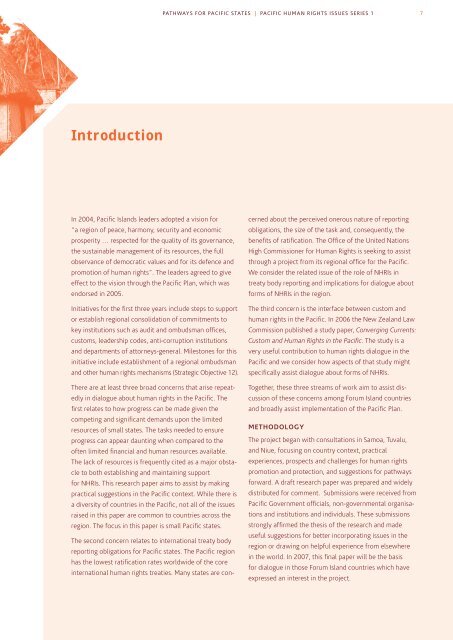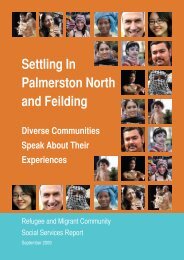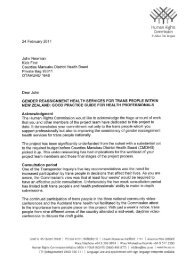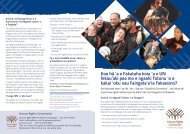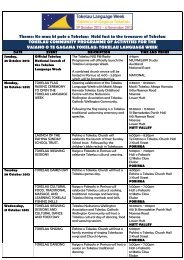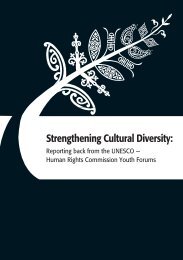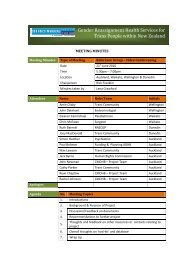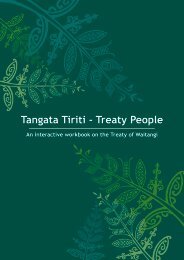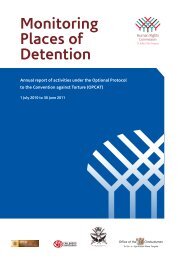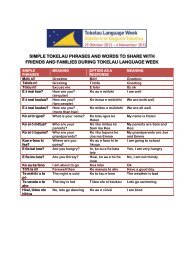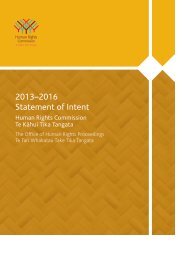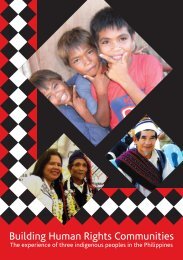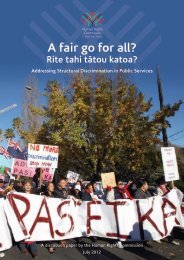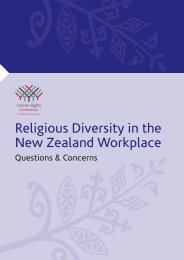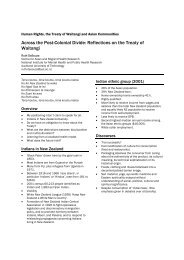National Human Rights Institutions Pathways for Pacific States
National Human Rights Institutions Pathways for Pacific States
National Human Rights Institutions Pathways for Pacific States
- No tags were found...
Create successful ePaper yourself
Turn your PDF publications into a flip-book with our unique Google optimized e-Paper software.
PATHWAYS FOR PACIFIC STATES | PACIFIC HUMAN RIGHTS ISSUES SERIES 1 7IntroductionIn 2004, <strong>Pacific</strong> Islands leaders adopted a vision <strong>for</strong>“a region of peace, harmony, security and economicprosperity … respected <strong>for</strong> the quality of its governance,the sustainable management of its resources, the fullobservance of democratic values and <strong>for</strong> its defence andpromotion of human rights”. The leaders agreed to giveeffect to the vision through the <strong>Pacific</strong> Plan, which wasendorsed in 2005.Initiatives <strong>for</strong> the first three years include steps to supportor establish regional consolidation of commitments tokey institutions such as audit and ombudsman offices,customs, leadership codes, anti-corruption institutionsand departments of attorneys-general. Milestones <strong>for</strong> thisinitiative include establishment of a regional ombudsmanand other human rights mechanisms (Strategic Objective 12).There are at least three broad concerns that arise repeatedlyin dialogue about human rights in the <strong>Pacific</strong>. Thefirst relates to how progress can be made given thecompeting and significant demands upon the limitedresources of small states. The tasks needed to ensureprogress can appear daunting when compared to theoften limited financial and human resources available.The lack of resources is frequently cited as a major obstacleto both establishing and maintaining support<strong>for</strong> NHRIs. This research paper aims to assist by makingpractical suggestions in the <strong>Pacific</strong> context. While there isa diversity of countries in the <strong>Pacific</strong>, not all of the issuesraised in this paper are common to countries across theregion. The focus in this paper is small <strong>Pacific</strong> states.The second concern relates to international treaty bodyreporting obligations <strong>for</strong> <strong>Pacific</strong> states. The <strong>Pacific</strong> regionhas the lowest ratification rates worldwide of the coreinternational human rights treaties. Many states are concernedabout the perceived onerous nature of reportingobligations, the size of the task and, consequently, thebenefits of ratification. The Office of the United NationsHigh Commissioner <strong>for</strong> <strong>Human</strong> <strong>Rights</strong> is seeking to assistthrough a project from its regional office <strong>for</strong> the <strong>Pacific</strong>.We consider the related issue of the role of NHRIs intreaty body reporting and implications <strong>for</strong> dialogue about<strong>for</strong>ms of NHRIs in the region.The third concern is the interface between custom andhuman rights in the <strong>Pacific</strong>. In 2006 the New Zealand LawCommission published a study paper, Converging Currents:Custom and <strong>Human</strong> <strong>Rights</strong> in the <strong>Pacific</strong>. The study is avery useful contribution to human rights dialogue in the<strong>Pacific</strong> and we consider how aspects of that study mightspecifically assist dialogue about <strong>for</strong>ms of NHRIs.Together, these three streams of work aim to assist discussionof these concerns among Forum Island countriesand broadly assist implementation of the <strong>Pacific</strong> Plan.METHODOLOGYThe project began with consultations in Samoa, Tuvalu,and Niue, focusing on country context, practicalexperiences, prospects and challenges <strong>for</strong> human rightspromotion and protection, and suggestions <strong>for</strong> pathways<strong>for</strong>ward. A draft research paper was prepared and widelydistributed <strong>for</strong> comment. Submissions were received from<strong>Pacific</strong> Government officials, non-governmental organisationsand institutions and individuals. These submissionsstrongly affirmed the thesis of the research and madeuseful suggestions <strong>for</strong> better incorporating issues in theregion or drawing on helpful experience from elsewherein the world. In 2007, this final paper will be the basis<strong>for</strong> dialogue in those Forum Island countries which haveexpressed an interest in the project.


